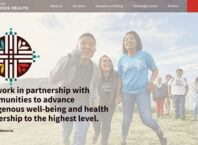By Lee Egerstrom
A study conducted at the University of Minnesota finds that students of color, and especially Native American students, are far less likely to finish college educations when they have experienced a death in the family.
While some academic institutions are developing programs to reach adult learners who have interrupted their educations, the new research is a call for colleges and universities to develop policies for helping these students who have drifted away.
“The findings show that it’s important to design college policies that consider and support all aspects of students’ lives, including their own health and the health of their families,” said Naomi Thyden, an epidemiologist and PhD candidate at the University’s School of Public Health.
Thyden, formerly with the Minnesota Department of Health, was the lead researcher in the study. Collaborators included Nicole M. Schmidt and Theresa Osypuk, faculty with the Division of Epidemiology and Community Health, and the Minnesota Population Center.
Their findings were recently published in the academic journal Annals of Epidemiology in an article “The unequal distribution of sibling and parent deaths by race and its effect on attaining a college degree.”
Thyden said in an interview her research interests focus on institutional policies and racial and ethnic health disparities.
This project’s research started long before the coronavirus pandemic struck early this year. But now, she said, the impact of COVID-19 on families and students “makes the research all the more timely.”
Using data from a 1997 study starting with 13 to 17 year-olds and 2013 data of 29 to 32 year-olds, the researchers found:
• 13.8 percent of Native American, 9.1 percent of Asian, 8.3 percent of Black, 5.0 percent of Hispanic and 4.2 percent of white youth experienced a family death in the tracked years.
• Young adults (age 19-22), when a parent or sibling died, were about half as likely to graduate from college.
• Adolescents of high school age when a sibling or parent died seemed to be less affected with finishing college degrees.
The researchers suggested the latter may be because the adolescents had time to recover from grief before starting college.
Thyden said surprising discoveries included looking at 29 to 32 year-olds. “People had time to go back and finish, but they hadn’t.
“It was like a window of opportunity had closed.”
People think of health as an individual issue, Thyden said. “It really is a community-wide issue. You may be healthy, but it can have effects on you if your community isn’t healthy.”
That becomes more relevant now with the coronavirus pandemic causing disproportionate illness and death within racial and ethnic minority communities, she said.
The study was supported by the National Institutes of Health and the Minnesota Population Center, with a grant from the Eunice Kennedy Shriver National Institute of Child Health and Human Development.
Looking at the findings as a community health matter, the authors said future research should look at reasons why a family death during college-age years makes it harder for students to graduate from college. And, researchers should look at other life experiences and college policies that might harm graduation rates for Black and Native American young adults.
They concluded that “racial disparities in mortality might affect social determinants of health of surviving relatives, and college policies are a potential intervention point.”
Colleges and universities might want to look at what community colleges are doing to reach older students, Thyden said. Good numbers of women go back to school after pausing to raise young children, and older students of both genders do go back to community colleges to resume studies for career advancements.
This is especially important now with the COVID-19 pandemic because colleges and universities may be cutting student support programs to save money, Thyden said.
Bucking what likely may become a trend, Minnesota State has programs in place to help students who have disrupted their college educations, but its lead program isn’t system wide.
MN Reconnect, a partnership between Minnesota State and the Minnesota Office of Higher Education, provides special services and benefits to help adult Minnesotans re-enroll in college to finish educations.
The program was started at a few community colleges in 2018 and was expanded in July to help students enroll for classes this fall at five additional schools.
Participating colleges include Central Lakes College (Brainerd and Staples), Dakota County Technical College (Rosemount), Inver Hills Community College (Inver Grove Heights), Lake Superior College (Duluth), Minneapolis College (Minneapolis), North Hennepin Community College (Brooklyn Park), Pine Technical & Community College (Pine City), Riverland Community College (Albert Lea, Austin and Owatonna), and South Central College (Faribault and North Mankato).
The MN Reconnect program helps adult, returning students with a personal advisor for college and for career planning, with scholarships of $1,000 per semester and other financial assistance that may prevent re-enrollment, and emergency financial assistance. It also helps with academic planning, accelerated degrees, gaining credit from previous learning, and with online and in-person tutoring.
In a July 2 announcement, the Minnesota Office of Higher Education (OHE) said the program not only addresses academic issues, “but social and basic needs such as child care, transportation, employment, food, and financial issues that can make all the difference in education outcomes.”
Adult learners are confronted with balancing work, life and school responsibilities, the announcement said.
Dennis Olson, OHE commissioner, made passing reference to the current environment of the COVID-19 virus and its economic impact. “In these uncertain times for so many families, a program like MN Reconnect can offer the financial and emotional support adult students need to face the challenge and embrace the opportunity to return to college and complete their degree,” he said.
Information on Thyden and colleagues’ study on the unequal impacts on education achievement after a death in family can be found at https://twin-cities.umn.edu/news-events/research-brief-black-and-native-american-youth-experience-more-family-deaths-may-reduce.
Minnesota State information on the MN Reconnect program, and links to participating colleges, are available at https://mnreconnect.com.
For updates and info on Covid-19, see: https://www.health.state.mn.us/diseases/coronavirus







